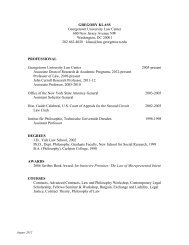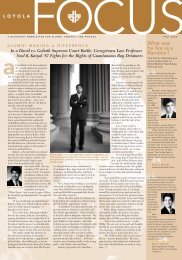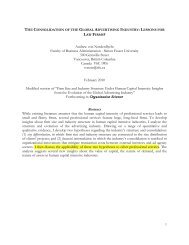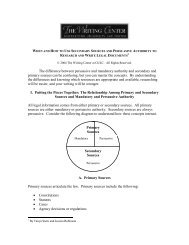Date: April 12, 2013 Topic: The Shrinking ... - Georgetown Law
Date: April 12, 2013 Topic: The Shrinking ... - Georgetown Law
Date: April 12, 2013 Topic: The Shrinking ... - Georgetown Law
You also want an ePaper? Increase the reach of your titles
YUMPU automatically turns print PDFs into web optimized ePapers that Google loves.
General Counsel with Power? 2011 <br />
Chapter 4: A Production-line Approach to Legal Work <br />
‘Commoditization’ is a dirty word in legal practice. All lawyers recognize that some parts of what they <br />
do are repetitive, routine, and boring. Nevertheless, lawyers consider those legal tasks to be a <br />
necessary part of legal work particularly for trainees and junior lawyers, resulting in deeper knowledge <br />
and experience for making better professional judgement. However, when corporate clients ask for <br />
better value for money, most lawyers begin to see that some of the work could be simplified, <br />
standardized, and shifted to less qualified workers in low-‐cost locations. A nagging worry persists, <br />
nevertheless: how can one maintain the quality of work done, the overall custody, and client <br />
confidentiality? But not so fast. <br />
This chapter summarizes the findings of this study in an area that is in a state of flux. <strong>The</strong>re is little <br />
agreement on terminology – disaggregation, decomposition, unbundling, etc. all uttered <br />
interchangeably. Several techniques originating from manufacturing – process mapping, Lean Six Sigma, <br />
Just-‐in-‐Time, etc. -‐-‐ fall off the tongue of some enthusiasts intent on transforming the way legal services <br />
are delivered, but without a system-‐wide perspective on what is holding back key actors from jumping <br />
on the bandwagon. Despite the existence of a well-‐articulated five-‐stage model from bespoke to <br />
commoditized legal service delivery (Susskind, 2008), the clock speed for adopting this model appears <br />
slow. This study attempts to describe and analyze the state of play – what the interviewed general <br />
counsel said and observed – without a teleological vision of the future. In this sense, this study does not <br />
judge whether legal services should become more like manufacturing; nor does the study take an <br />
optimistic or pessimistic stance on the possibility of change. It attempts, however, to accurately reflect <br />
and understand who is implementing what types of change for what reason. <br />
A ‘Production-line Approach’ <br />
Ted Levitt was one of the earliest advocates of the ‘production-‐line approach’ to service in the early <br />
1970s. He argued that services would benefit from drastic improvements in quality and efficiency at the <br />
same time if they adopted a manufacturing approach to its activities that substituted technology and <br />
systems for people and serendipity (Levitt, 1972). What he had in mind was the key principles of <br />
scientific management that Fredrick Taylor articulated in the 1910s, namely the separation of planning <br />
from execution, the standardization of products and processes, and the training of workers to carry out <br />
tasks. History tells us that mass production based on these principles supplanted craft production due <br />
to discontinuous efficiency gains. <br />
14 <br />
<strong>The</strong> work of lawyers today may be on the cusp of a similar transformation due to digital technology, <br />
globalization, and new entrants. Whilst bespoke work continues to exist, legal work may be subjected <br />
to treatment similar in nature to that which has been applied to automobile assembly for over a century. <br />
Said Business School | University of Oxford
















